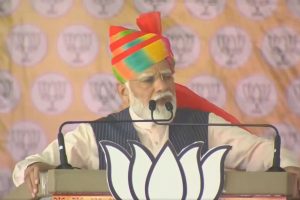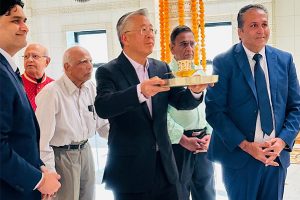Ambassador Eynat Shlein is the Head of MASHAV, Israel’s International Development Centre, in the Israeli Ministry of Foreign Affairs. Born and raised in Israel, she joined the Foreign Service as a career diplomat in 1992, specialising in the Middle East region, Israeli-Arab relations and American affairs, promoting dialogue and understanding in the region. She was recently on a visit to India and extensively toured Delhi, Uttar Pradesh and Rajasthan for promoting Indo-Israeli cooperation in agriculture. Taking time off her busy schedule, Shlein spoke to Ashok Tuteja on India-Israeli relations and Israel’s much-appreciated ”Shining Star” mission in war-torn Ukraine.
Q. How do you look at the current state of relations between India and Israel?
A: The continued expansion of the India-Israel bilateral relationship reflects the strategic alliance between the two nations. During my visit to India, I was delighted to witness the love and admiration for Israel among many Indians and the vast potential for enhancing our partnership. In fact, the relations between our nations go back decades, as two old civilisations with close cultural links and historical ties – India is already mentioned in the Bible. Currently our relations are growing and prospering. India is also a strong, strategic partner of Israel. We are determined to work together to further strengthen our bond and take it to new heights.
Advertisement
Q. What was the purpose of your visit to India?
A: I travelled to India in order to inspect MASHAV’s vast activities in the country and explore ways to further strengthen our bilateral development cooperation in the fields of agriculture and water, as well as other relevant sectors, such as education, public health, etc.
Q. Do you think the two countries have achieved the true potential of their ties since they established full diplomatic relations 30 years back?
A: The relations reached a record high and are getting closer every day. Beyond the continuous dialogue between many government ministries regarding agriculture, water, health, education, emergency response, innovation, technology and more, there are also plenty of activities underway led by our business sectors and various organizations. Companies, startups, entrepreneurs, academicians, NGOs and more are meeting in person and in virtual rooms and continue to bring India and Israel closer on every level and in every field.
Q. India-Israel cooperation in the agriculture sector has progressed by leaps and bounds in the last 30 years. Could you please tell us more about cooperation in this sector? Can you name a few agriculture projects in which Israel is participating in India?
A: We are committed to continue expanding our cooperation with all our partners in India in the agriculture and water sectors, pursuing sustainable development. MASHAV is engaged in such projects all over the world, in 140 countries, through short and long term projects, emphasising capacity building. In this framework, we have posted six experts in three continents, to provide professional assistance on national scale policy planning and national infrastructure – two out of these six experts are posted in India, one specialising in agricultural affairs and the other in water and irrigation. This fact alone, I believe, reflects the special importance allocated by MASHAV and the state of Israel to India, as well as our longterm commitment. By the same token, currently we have 29 fullyactive Indo-Israeli Centers of Excellence in different parts of India, which are benefiting millions of Indian farmers on a daily basis, providing them with professional instruction and high-quality seedlings, which lead to much higher yields. Thirteen more such centers are in the pipeline and hopefully will be fully functional within a year. These centers will gradually be expanded into Villages of Excellence, in partnership with local state governments, which will further prove beneficial for larger populations. We also have a flagship water project currently under way in Bundelkhand, Uttar Pradesh, to address the water challenges in the region.
Q. You specialise in Middle Eastern affairs. Israel now has full diplomatic ties with a number of countries in the Middle East. What is the level of business and economic cooperation between Israel and the Middle Eastern countries in which you have a diplomatic presence?
A: We have enjoyed full diplomatic relations with Egypt (since 1979) and Jordan (from 1994), yet the signing of the Abraham Accords in 2020 turned into a significant turning point, expanding the volume of the regional engagement: it created numerous opportunities for regional and multinational cooperation in the region in different fields – business, trade, tourism, energy, sustainability and much more. This also holds a lot of potential for multilateral collaborations for Indian and Israeli business people. The Accords have strengthened bonds between nations and people, and continue to create exciting economic opportunities for all.
Q. Israel has also actively participated in the humanitarian aid efforts in Ukraine in wake of the ongoing conflict there. Can you please elaborate on the ”Shining Star” mission?
A: As the war broke out in Ukraine, Israel was quick to respond, through MASHAV and also through the work of many Israeli NGOs and individuals, who were deeply moved by the events and offered assistance. One of the highlights of Israel’s continuous campaign to provide humanitarian assistance to Ukraine was Operation ‘Shining Star’: Israel built a field hospital in Western Ukraine, a cooperation between the Ministry of Foreign Affairs and the Ministry of Health in Israel. It was the only civilian field hospital that was operating on Ukrainian territory and was aimed to provide treatment for the many refugees who fled into the region. For six weeks, it offered a high standard of medical care and provided much-needed medical response to a steady stream of refugees, incorporating the use of advanced medical technologies. That is only one example: since the beginning of the war, MASHAV provided and continues to provide, hundreds of tonnes of medicines, medical equipment, personal gear (blankets, coats, sleeping bags, etc.), water purification kits for 100,000 people, food to citizens in besieged cities and many other forms of assistance. There are also many online capacity-building sessions and training sessions organised for Ukrainian caregivers, community leaders, and medical professionals.
Q. Israel’s former Prime Minister Benjamin Netanyahu was a great personal friend of India. What is the personal equation between Prime Minister Narendra Modi and Prime Minister Naftali Bennett?
A: Prime Minister Naftali Bennett believes in the strong strategic alliance between India and Israel, as a significant partnership benefiting both countries. The close relationship between our two nations is very apparent, both on the leadership and the popular level. We are keen to continue and expand our cooperation with all our partners in India as we continue enhancing the special bond between our two nations.
Q. Is there any high-level visit planned between India and Israel in the coming weeks?
A: One of the high-profile visits that we are hoping to have this year is a formal visit of Israel’s Prime Minister Naftali Bennett. This visit was already planned yet unfortunately cancelled at the last minute, due to a diagnosis of Covid-19. We definitely look forward to a high-level Israeli visit this year, to mark 30 years of full diplomatic relations.
Advertisement











